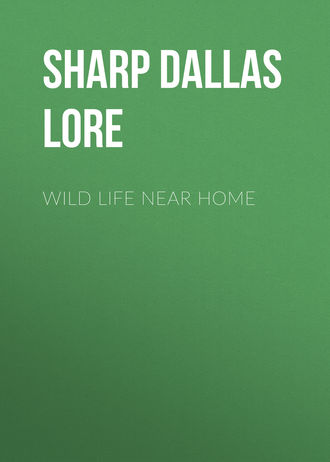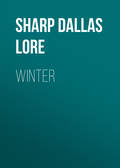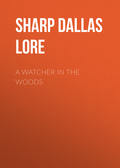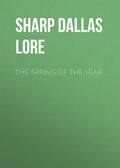
Sharp Dallas Lore
Wild Life Near Home
When, however, he has a fancy for the orchard, this dainty little warbler shows us what the wood-birds can do in the way of friendship and sociability.
Across the road, in an apple-tree whose branches overhang a kitchen roof, built a pair of redstarts. No one discovered the birds till the young came; then both parents were seen about the yard the whole day long. They were as much at home as the chickens, even more familiar. Having a leisure moment one day, when a bicycle was being cleaned beneath the tree, the inquisitive pair dropped down, the female actually lighting upon the handle-bar to see how the dusting was done. On another occasion she attempted to settle upon the baby swinging under the tree in a hammock; and again, when I caught one of her own babies in my hands, she came, bringing a worm, and, without the slightest fear of me, tried to feed it. Yet she was somewhat daunted by the trap in which her infant was struggling; she would fan my hands with her wings, then withdraw, not able to muster quite enough courage to settle upon them.
Neither of these birds ever showed alarm at the people of the house. In fact, I never saw a redstart who seemed to know that we humans ought to be dreaded. These birds are now as innocent of suspicion as when they came up to Adam to be named. On two occasions, during severe summer storms, they have fluttered at my windows for shelter, and dried their feathers, as any way-worn traveler might, in safety beneath my roof.
From the window one morning I saw Chebec, the least flycatcher, light upon the clothes-line. She teetered a moment, balancing her big head by her loosely jointed tail, then leaped lightly into the air, turned, – as only a flycatcher can, – and, diving close to the ground, gathered half the gray hairs of a dandelion into her beak, and darted off. I followed instantly, and soon found her nest in one of the orchard trees. It was not quite finished; and while the bird was gone for more of the dandelion down, I climbed up and seated myself within three feet of the nest.
Back came Mrs. Chebec with a swoop, but, on seeing me, halted short of the nest. I was motionless. Hopping cautiously toward the nest, she took an anxious look inside; finding nothing disturbed, she concluded that there was no evil in me, and so went on with her interesting work. It was a pretty sight. In a quiet, capable, womanly way she laid the lining in, making the nest, in her infinite mother-love, fit for eggs with shells of foam.
The chebec is a finished architect. Better builders are few indeed. The humming-bird is slower, more painstaking, and excels Chebec in outside finish. But Chebec's nest is so deep, so soft, so round and hollow! There is the loveliness of pure curve in its walls. And small wonder! She bends them about the beautiful mold of her own breast. Whenever she entered with the dandelion cotton, she went round and round these walls, before leaving, pressing them fondly with her chin close against her breast. She could not make them sufficiently safe nor half lovely enough for the white, fragile treasures to be cradled there.
Artists though they be, the chebecs, nevertheless, are very tiresome birds. They think that they can sing – a sad, sorry, maddening mistake. Mr. Chapman says the day that song was distributed among the birds the chebecs sat on a back seat. Would they had been out catching flies! In the chatter of the English sparrow, no matter how much I may resent his impudence and swagger, there is something so bright and lively that I never find him really tiresome. But the chebecs come back very early in spring, and sit around for days and days, catching flies, and jerking their heads and calling, Chebec! chebec! chebec! till you wish their heads would snap off.
In the tree next to the chebec's was a brood of robins. The crude nest was wedged carelessly into the lowest fork of the tree, so that the cats and roving boys could help themselves without trouble. The mother sputtered and worried and scolded without let-up, trying to make good her foolishness in fixing upon such a site by abundance of anxiety and noise.
The fussiest, least sensible mother among the birds is the robin. Any place for her nest but a safe one! The number of young robins annually sacrificed to pure parental carelessness is appalling. The female chooses the site for the home, and her ability for blundering upon unattractive and exposed locations amounts to genius. She insists upon building on the sand. Usually the rain descends, the floods come, the winds blow, and there is a fall.
Here is a pair building upon a pile of boards under a cherry-tree; another pair plaster their nest to the rider of an old worm-fence; while a third couple, abandoning the woods near by, plant theirs, against all remonstrance, upon the top of a step-ladder that the brickmakers use daily in their drying-sheds.
It was the superlative stupidity of this robin that saved her family. The workmen at first knocked her nest off to the ground. She had plenty of clay at hand, however, and began her nest again, following the ladder as it moved about the shed. Such amazing persistence won, of course. Out of wonder, finally, the men gave the ladder over to her and stood aside till her family affairs were attended to. Everything was right in time. After infinite scolding, she at last came off in triumph, with her brood of four.
A striking illustration of this growing alliance between us and the birds is the nest of the great-crested flycatcher in the orchard. Great-crest has almost become an orchard-bird. At heart he is, and ever will be, a bird of the wilds. He is not tame – does not want to be tame; he is bold, and the dangers and advantages of orchard life attract him. His moving into an apple orchard is no less a wonder than would be an Apache chief's settling in New York or Boston.
Most observers still count Great-crest among the wild and unreclaimed. Florence A. Merriam, speaking of his return in spring, says: "Not many days pass, however, before he is so taken up with domestic matters that his voice is rarely heard outside the woods"; and in Stearns's "Birds" I find: "It does not court the society of man, but prefers to keep aloof in the depths of the forest, where it leads a wild, shy, and solitary life." This is not Great-crest as I know him. I have found many of his nests, and never one in any but orchard trees. Riding along a country road lately, I heard Great-crest's call far ahead of me. I soon spied him on the wires of a telegraph-pole. Under him was a pear-tree, and a hundred yards away a farm-house. In the pear-tree I found his nest – snake-skins and all.
I disagree, too, with most descriptions of this bird's cry. The authors I have read seem never to have heard him on a quiet May morning across a fifty-acre field. His voice is "harsh and discordant" when sounded into one's very ears. The sweetest-toned organ would be discordant to one inside the instrument. Give the bird the room he demands, – wide, early-morning fields, – and listen. A single shout, almost human it seems, wild, weird, and penetrating, yet clear and smooth as the blast of a bugle. One can never forget it, nor resist it; for it thrills like a resurrection call – the last, long summons to the spring waking. This solitary note is often repeated, but is never so rapid nor so long drawn out as the call of the flicker.
Great-crest is a character, one of the most individual of all our birds. What other bird lines his nest with snake-skins? or hangs such gruesome things out for latch-strings? He has taken up his residence among us, but he has given us pretty plainly to understand that we need not call, else I mistake the hint in the scaly skin that dangles from his door. The strong personality of the bird is stamped even upon its eggs. Where are any to match them for curious, crazy coloring? The artist had purple inks, shading all the way from the deepest chestnut-purple to the faintest lilac. With a sharp pen he scratched the shell from end to end with all his colors till it was covered, then finished it off with a few wild flourishes and crosswise scrawls.
Like the birds of the orchards and buildings, the field-birds also are yielding to human influences. We can almost say that we have an order of farm-birds, so many species seem to have become entirely dependent upon the pasture and grain-field.
"Where did Bobolink disport himself before there were meadows in the North and rice-fields in the South? Was he the same lithe, merry-hearted beau then as now?" I do not know. But I do know that, in the thirty and three years since Mr. Burroughs asked the question, Bobolink has lost none of his nimbleness, nor forgotten one bubbling, tinkling note of his song. Yet in his autumn journey South, from the day he reaches the ripe reeds of the Jersey marshes till he is lost in the wide rice-lands of Georgia, his passage is through a ceaseless, pitiless storm of lead. Dare he return to us in spring? and can he ever sing again? He will come if May comes – forgetting and forgiving, dressed in as gay a suit as ever, and just as full of song.
There is no marvel of nature's making equal to the miracle of her temper toward man. How gladly she yields to his masterful dominion! How sufferingly she waits for him to grow out of his spoiled, vicious childhood. The spirit of the bobolink ought to exorcise the savage out of us. It ought, and it does – slowly.
We are trying, for instance, to cow the savage in us by law, to restrain it while the birds are breeding; but we hardly succeed yet. The mating season is scarcely over, the young not yet grown, when the gunners about me go into the fields with their dogs and locate every covey of quail, even counting the number of birds in each. With the dawn of the first day of open season they are out, going from flock to flock, killing, till the last possible bird is in their bloody bags.
One of the most pathetic of all the wordless cries of the out-of-doors is the covey-call of the female quail at night, trying to gather the scattered flock together after the dogs are called off and the hunters have gone home.
It was nearly dark one December afternoon, the snow ankle-deep and falling swiftly, when, crossing a wide field, I heard this call from a piece of sprout-land ahead of me. Kneeling in the snow, I answered the whistle. Instantly came a reply. Back and forth we signaled till there was a whir of wings, and down in the soft snow within a few feet of me dropped the lonely, frightened quail. She was the only one left of a covey that the night before had roosted unbroken, snugly wedged, with their tails together, under a pile of brush.
Sharing the fields with the quails are the meadow-larks. They scale along the grass, rarely rising higher than the cedars, flapping rapidly for a short distance, then sailing a little in a cautious, breath-held manner, as though wings were a new invention and just a trifle dangerous yet. On they go to a fence-stake, and land with many congratulatory flirts of wings and tail. Has anybody observed the feat? They look around. Yes; here I sit, – a man on a fence across the field, – and the lark turns toward me and calls out: "Did you see me?"
He would be the best-bred, most elegant of our birds, were it not for his self-consciousness. He is consumed with it. There is too much gold and jet on his breast. But, in spite of all this, the plain, rich back and wings, the slender legs, the long, delicate beak, the erect carriage, the important air, the sleek, refined appearance, compel us to put him down an aristocrat.
In a closely cropped pasture near the house, in early June, I found the eggs of the night-hawk. There was no nest, of course: the eggs lay upon the grass, and, for safety, had been left directly under the fence. The cows might not step on them here, but nothing prevented their crushing the fragile things with their noses.
Lengthwise, upon one of the rails, slept the mother. She zigzagged off at my approach, dazzled and uncertain in the white light of the noon, making no outcry nor stopping an instant to watch the fate of her eggs. She acted like a huge bat, slinking and dodging, out of her element in the light, and anxious to be hid. She did not seem like a creature that had a voice; and the way she flew would make one think that she did not know the use of her wings. But what a circus flier she is at night! and with what an uncanny noise she haunts the twilight! She has made more hair stand on end, with her earthward plunge and its unearthly boom through the dusk, than all the owls together. It is a ghostly joke. And who would believe in the daylight that this limp, ragged lump, dozing upon the fence or the kitchen roof, could play the spook so cleverly in the dark?
III
On the 25th of April, before the trees were in leaf, I heard the first true wood-note of the spring. It came from the tall oaks beyond the garden. "Clear, clear, clear up!" it rang, pure, untamed, and quickening. The solitary vireo! It was his whistle, inimitable, unmistakable; and though I had not seen him since last July, I hurried out to the woods, sure he would greet me.
Solitary is the largest, rarest, tamest, and sweetest-voiced of the vireos. I soon found him high in the tops of the trees; but I wanted him nearer. He would not descend. So I chased him, stoning and mocking him even, till, at last, he came down to the bushes and showed me his big blue head, white eye-rings, wing-bars, and yellow-washed sides.
He did more than show himself: he sang for me. Within ten feet of me, he began a quiet little warble of a tenderness and contentment I never heard before. Such variety of notes, such sweetness of melody, such easy, unconscious rendering! It was a love-song, but sung all to himself, for he knew that there was no gentle heart to listen this side of Virginia. He sang to his own happy heart as pure and sweet a song as the very angels know.
Solitary disappeared from that day. I concluded he had gone to heavier, wilder woods to nest. It was late in June that, passing through this brush-land, I saw hanging from an oak sapling, just above my head, a soft, yellowish basket. It was a vireo's nest; but it was too large, too downy, too yellow for Red-eye. There were no bunches of white spider-webs upon it, such as Red-eye hangs all over his nest. I stepped aside for a better view, and had just caught the glint of a large, white-ringed eye peering over the nest's edge at me, when, off in the woods behind me, the noon hush was startled by Solitary's whistle – a round, pure, pearly note that broke the quiet as pearly teeth break through the smile of a beautiful face. He soon appeared, coming on, a tree at a time, looking and asking, in no hurry and in no alarm. When he reached the pine overhead, his mate left the nest to confer with him. They scolded me mildly while I climbed for a look at the four delicately spotted eggs; but as soon as I lay down upon the ground, the mother, without fuss or fear, slipped into the nest and cuddled down over the eggs till her head hardly showed above the rim. Had a few bushes been removed I could have seen the nest from my front door.
Why do the wood-birds so persistently build their nests along the paths and roads? I said that even the hermit-thrush prefers a wood with a road through it. If he possibly can he will build along that road. And what one of the birds will not? Is it mere stupidity? Is it curiosity to see what goes on? Is there some safety here from enemies worse than boys and cats and dogs? Or is it that these birds take this chance for human fellowship? If this last is the reason for their rejecting the deep tangles for limbs that overhang roads and tufts of grass in constantly traveled foot-paths, then they can be pardoned; otherwise they are foolish – fatally foolish.
The first black-and-white warbler's nest I ever found was at the base of a clump of bushes in a narrow wood-path not ten feet from a highway. There were acres of bushes beyond, thick and pathless, all theirs to choose from.
In the same piece of scrub-oak the summer after I found another black-and-white warbler's nest. The loud talk of three of the birds attracted me. Two of them were together, and just mated, evidently; the third was a male, and just as plainly the luckless suitor. He was trying to start a quarrel between the young couple, doing his best to make the new bride break her vows. He flew just ahead of them, darting to the ground, scuttling under the brush, and calling out, "See here! Come here! Don't fool with him any longer! I have the place for a nest!"
But the pair kept on together, chatting brightly as they ran up and down the trees and hunted under the fallen limbs and leaves for a home-site. The male led the way and found the places; the female passed judgment. I followed them.
Every spot the cock peeped into was the finest in the woods; his enthusiasm was constant and unbounded. "Any place is heaven," he kept repeating, "any place, so long as I have you." But she was to do the housekeeping, and the ecstasies of the honeymoon were not to turn her head. She was house-hunting; and, like every woman, at her best. She said "no," and "no," and "no." I began to think they never would find the place, when the male darted far ahead and went out of sight beneath some low huckleberry-bushes near a stone wall. This wall ran between the woods and a pasture; and parallel with it, on the woods side, was a foot-path.
Up came the little hen, and together they scratched about under the leaves. Suddenly the cock flew away and fetched a strip of chestnut bark. This he turned over to his wife. Then both birds flew out to the chestnut limbs for bark, and brought their strips back. The home was founded.
It was the merest cavity, pushed into the dead leaves, with three shreds of bark for first timbers. In less than a week the structure was finished and furnished – with a tiny white egg thickly sprinkled with brown. I watched the spot daily, and finally saw the four young warblers safely out into their new woods-world. But from the day the first egg was laid until the nestlings left I constantly expected to find everything crushed under the foot of some passer-by.
When free from household cares the chickadee is the most sociable of the birds of the woods. But he takes family matters seriously, and withdraws so quietly to the unfrequented parts of the woods during nesting-time as to seem to have migrated. Yet of the four chickadees' nests found about the house, one was in a dead yellow birch in a bit of deep swamp, two others were in yellow birches along wood-roads, and the fourth was in a rotten fence-post by the main road, a long way from any trees.
A workman while mending the fence discovered this last nest. The post crumbled in his hands as he tried to pull it down, revealing the nest of moss and rabbit hair, with its five brown-and-white eggs. He left the old post, propped it up with a sound one, and, mending the broken walls of the cavity the best he could, hurried along with his task, that the birds might return. They came back, found the wreckage of dust and chips covering the eggs, tried the flimsy walls – and went away. It was a desecrated home, neither safe nor beautiful now; so they forsook it.
There is no eagle's nest in this collection of thirty-six. But if Mr. Burroughs is correct, there is the next thing to it – a humming-bird's nest; three of them, indeed, one of which is within a stone's throw of my door! This one is in the oaks behind my garden, but the other two are even nearer to houses. One of these is upon the limb of a pear-tree. The tip of this limb rubs against a woodshed connected with a dwelling. The third nest is in a large apple orchard, in the tree nearest the house, and saddled upon that branch of the tree which reaches farthest toward the dwelling. So close is this nest that I can look out of the garret window directly into it.
I believe that Ruby-throat is so far domesticated that he rejoices over every new flower-garden. There was nearly half an acre of gladioli in the neighborhood one summer, where all the humming-birds gathered from far and near. Here, for the only time in my life, I saw a flock of humming-birds. I counted eight one day; and the gardener told me that he had often seen a dozen of them among the spikes. They squeaked like bats, and played – about as bullets might play. In fact, I think I dodged when they whizzed past me, as a soldier does the first time he is under fire.
One of my friends had a cellar window abloom with geraniums. A ruby-throat came often to this window. One day the mistress of the flowers caught the wee chap in her hands. He knew at once that she meant no harm and quietly submitted. A few days later he returned and was captured again. He liked the honey, and evidently the fondling, too, for he came very regularly after that for the nectar and the lady's soft hands.
The nest behind my garden is in the top of a tall, slender maple, with oaks and chestnuts surrounding and overshadowing it. Finding a nest like this is inspiration for the rest of life. The only feat comparable to it is the discovery of a bee-tree. Finding wild bees, I think, would be good training for one intending to hunt humming-birds' nests in the woods. But no one ever had such an intention. No one ever deliberately started into the woods a-saying, "Go to, now; I'll find a humming-bird's nest in here!"
Humming-birds' nests are the gifts of the gods – rewards for patience and for gratitude because of commoner grants. My nests have invariably come this way, or, if you choose, by accident. The nearest I ever came to earning one was in the case of this one in the maple. I caught a glimpse of a humming-bird flashing around the high limbs of a chestnut, so far up that she looked no bigger than a hornet. I suspected instantly that she was gathering lichens for a nest, and, as she darted off, I threw my eyes ahead of her across her path. It was just one chance in ten thousand if I even saw her speeding through the limbs and leaves, if I got the line of her flight, to say nothing of a clue to her nesting-place. It was little short of a miracle. I had tried many times before to do it, but this is the only time I ever succeeded: my line of vision fell directly upon the tiny builder as she dropped to her nest in the sapling.
The structure was barely started. I might have stared at it with the strongest glass and never made it out a nest; the sapling, too, was no thicker at the butt than my wrist, and I should not have dreamed of looking into its tall, spindling top for any kind of a nest. Furthermore, as if to rob one of the last possibility of discovering it, a stray bud, two years before, had pushed through the bark of the limb about three inches behind where the nest was to be fixed, and had grown, till now its leaves hung over the dainty house in an almost perfect canopy and screen.
For three weeks the walls of this house were going up. Is it astonishing that, when finished, they looked like a growth of the limb, like part and parcel of the very tree? I made a daily visit to the sapling until the young birds flew away; then I bent the tree to the ground and brought the nest home. It now hangs above my desk, its thick walls, its downy bed, its leafy canopy telling still of the little mother's unwearied industry, of her infinite love and foresight. So faultlessly formed, so safely saddled to the limb, so exquisitely lichened into harmony with the green around, this tiniest nest speaks for all of the birds. How needless, how sorry, would be the loss of these beautiful neighbors of our copses and fields!
A muskrat's domestic life is erratic. Sometimes there will be a large village in the pond, and, again, an autumn will pass without a single new house being built. It may be that some of the old houses will be fitted up anew and occupied; but I have known years when there was not a house in the pond. At no time do all of the muskrats build winter houses. The walls of the meadow ditches just under the dam are honeycombed with subterranean passages, in which many of the muskrats live the year round. Neither food nor weather, so far as I have found, influence them at all in the choice of their winter quarters. In low, wet meadows where there are no ditches, the muskrats, of course, live altogether in mud and reed houses above ground, for the water would flood the ordinary burrow. These structures are placed on the tussocks along a water-hole, so that the dwellers can dive out and escape under water when danger approaches. But here in the tide-meadows, where the ditches are deep, the muskrats rear their families almost wholly in underground rooms. It is only when winter comes, and family ties dissolve, that a few of the more sociable or more adventurous club together, come up to the pond, and while away the cold weather in these haystack lodges.
These houses are very simple, but entirely adequate. If you will lift the top off an ordinary meadow lodge you will find a single room, with a bed in the middle, and at least one entrance and one exit which are always closed to outsiders by water.
The meadow lodge is built thus: The muskrat first chooses a large tussock of sedge that stands well out of the water for his bedstead. Now, from a foundation below the water, thick walls of mud and grass are erected inclosing the tussock; a thatch of excessive thickness is piled on; the channels leading away from the doors are dug out if necessary; a bunch of soaking grass is brought in and made into a bed on the tussock – and the muskrat takes possession.
The pond lodges at the head of Lupton's are made after this fashion, only they are much larger, and instead of being raised about a tussock of sedge, they are built upon, and inclose, a part of a log or stump.
This lodge life is surely a cozy, jolly way of passing the winter. The possums are inclined to club together whenever they can find stumps that are roomy enough; but the muskrats habitually live together through the winter. Here, in the single room of their house, one after another will come, until the walls can hold no more; and, curling up after their night of foraging, they will spend the frigid days blissfully rolled into one warm ball of dreamful sleep. Let it blow and snow and freeze outside; there are six inches of mud-and-reed wall around them, and, wrapped deep in rich, warm fur, they hear nothing of the blizzard and care nothing for the cold.
Nor are they prisoners of the cold here. The snow has drifted over their house till only a tiny mound appears; the ice has sealed the pond and locked their home against the storm and desolation without: but the main roadway from the house is below the drifting snow, and they know where, among the stumps and button-bushes, the warm-nosed watchers have kept breathing-holes open. The ice-maker never finds their inner stair; its secret door opens into deep, under-water paths, which run all over the bottom of the unfrozen pond-world.
Unless roused by the sharp thrust of a spear, the muskrats will sleep till nightfall. You may skate around the lodge and even sit down upon it without waking the sleepers; but plunge your polo-stick through the top, and you will hear a smothered plunk, plunk, plunk, as one after another dives out of bed into the water below.
The moon climbed higher up the sky and the minutes ran on to ten o'clock. We waited. The night was calm and still, and the keen, alert air brought every movement of the wild life about us to our ears. The soft, cottony footfalls of a rabbit, hopping leisurely down the moonlit path, seemed not unlike the echoing steps on silent, sleeping streets, as some traveler passes beneath your window; a wedge of wild geese honked far over our heads, holding their mysterious way to the South; white-footed mice scurried among the dried leaves; and our ears were so sharpened by the frosty air that we caught their thin, wiry squeaks.
Presently there was a faint plash among the muskrat houses. The village was waking up. Uncle Jethro poked the long nose of his gun cautiously through the bushes, and watched. Soon there was a wake in one of the silvery roads, then a parting of waves, and stemming silently and evenly toward us, we saw the round, black head of a muskrat.
It was a pretty sight and a pretty shot; but I would not have had the stillness and the moonlit picture spoiled by the blare of that murderous musket for the pelts of fifty muskrats, and as the gun was coming to Uncle Jethro's shoulder, I slipped my hand under the lifted hammer.
With just an audible grunt of impatience the old negro understood, – it was not the first good shot that my love of wild things had spoiled for him, – and the unsuspecting muskrat swam on to the dam.
A plank had drifted against the bank, and upon this the little creature scrambled out, as dry as the cat at home under the roaring kitchen stove. Down another road came a second muskrat, and, swimming across the open water at the dam, joined the first-comer on the plank. They rubbed noses softly – the sweetest of all wild-animal greetings – and a moment afterward began to play together.
They were out for a frolic, and the night was splendid. Keeping one eye open for owls, they threw off all other caution, and swam and dived and chased each other through the water, with all the fun of boys in swimming.
On the bottom of the pond about the dam, in ten or twelve feet of water, was a bed of unios. I knew that they were there, for I had cut my feet upon them; and the muskrats knew they were there, for they had had many a moonlight lunch of them. These mussels the muskrats reckon sweetmeats. They are hard to get, hard to crack, but worth all the cost. I was not surprised, then, when one of the muskrats sleekly disappeared beneath the surface, and came up directly with a mussel.
There was a squabble on the plank, which ended in the other muskrat's diving for a mussel for himself. How they opened them I could not clearly make out, for the shells were almost concealed in their paws; but judging from their actions and the appearance of other shells which they had opened, I should say that they first gnawed through the big hinge at the back, then pried open the valves, and ate out the contents.







